2023-2024学年英语鲁教版(五四学制)六年级下册Unit 3Can you play the guitar? 单元习题课件 (共22张PPT)
文档属性
| 名称 | 2023-2024学年英语鲁教版(五四学制)六年级下册Unit 3Can you play the guitar? 单元习题课件 (共22张PPT) |
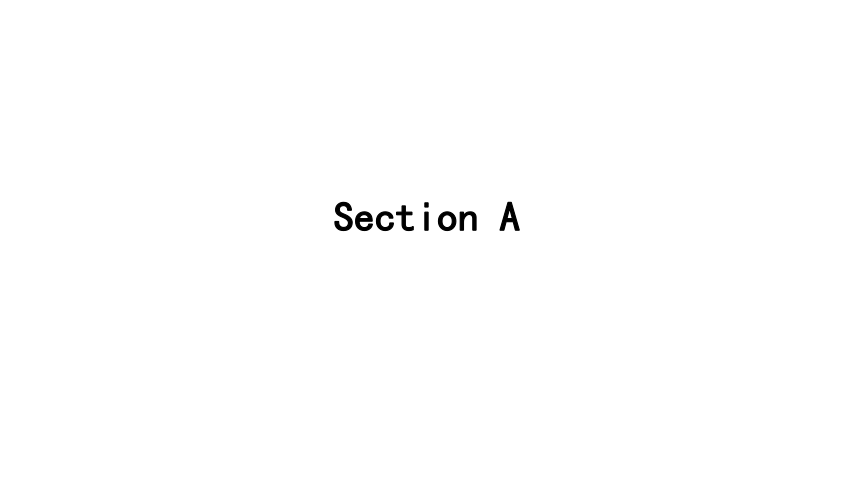
|
|
| 格式 | pptx | ||
| 文件大小 | 330.7KB | ||
| 资源类型 | 教案 | ||
| 版本资源 | 鲁教版 | ||
| 科目 | 英语 | ||
| 更新时间 | 2024-07-05 20:29:42 | ||
图片预览

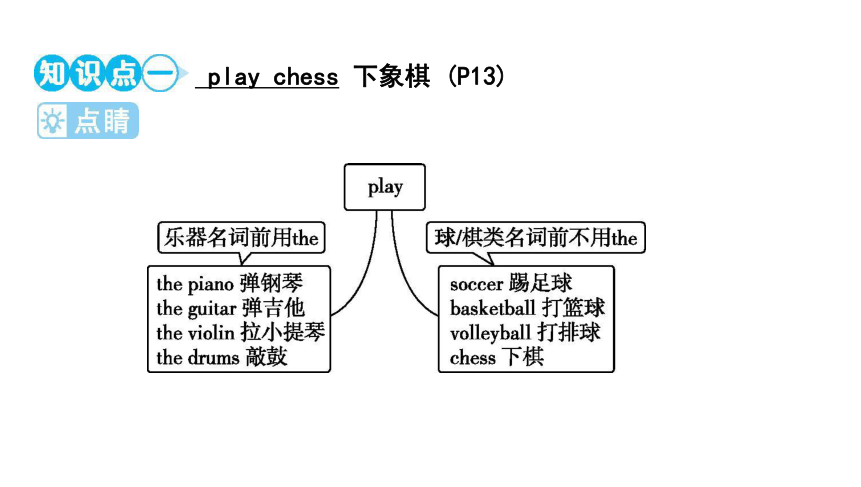
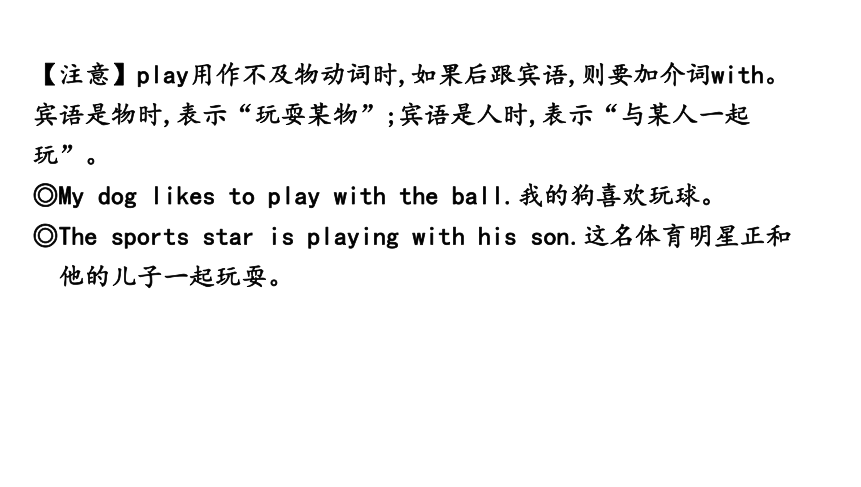
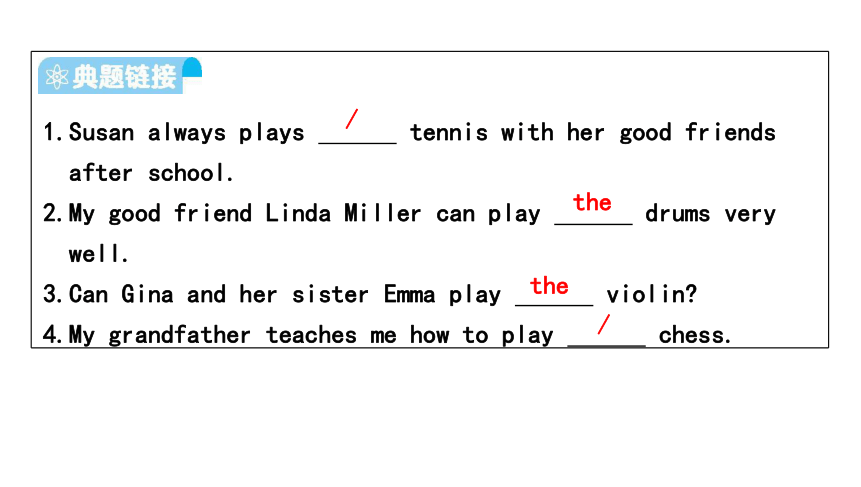
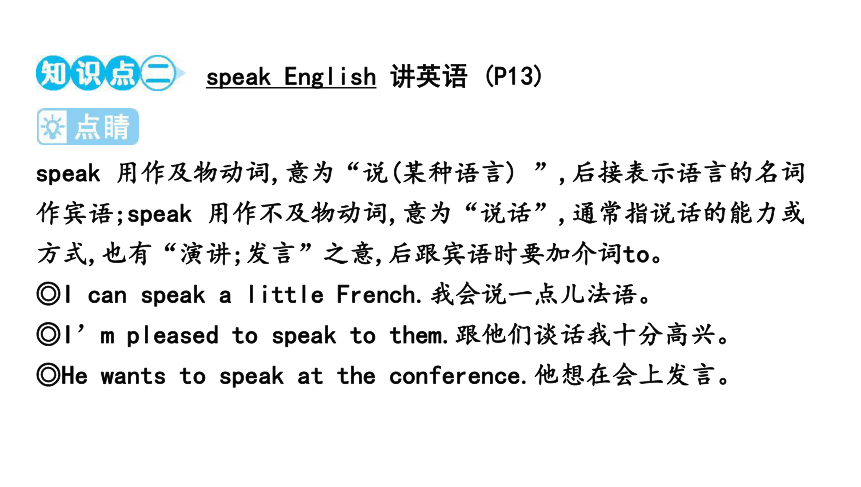
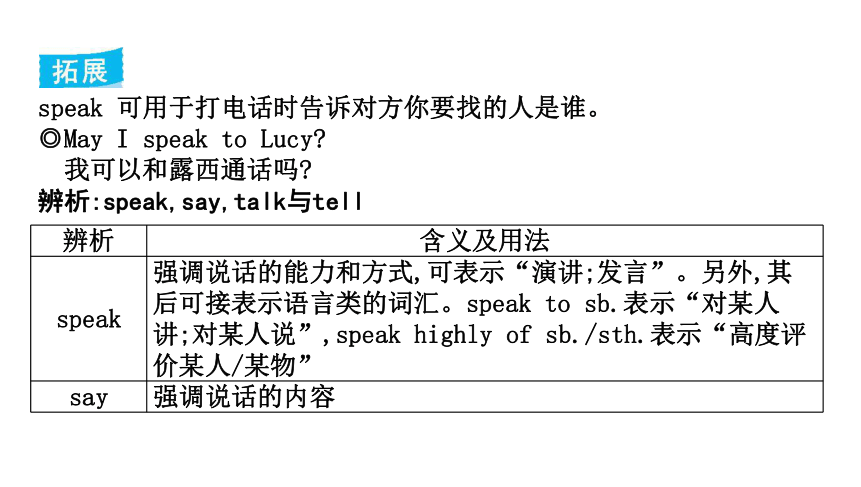
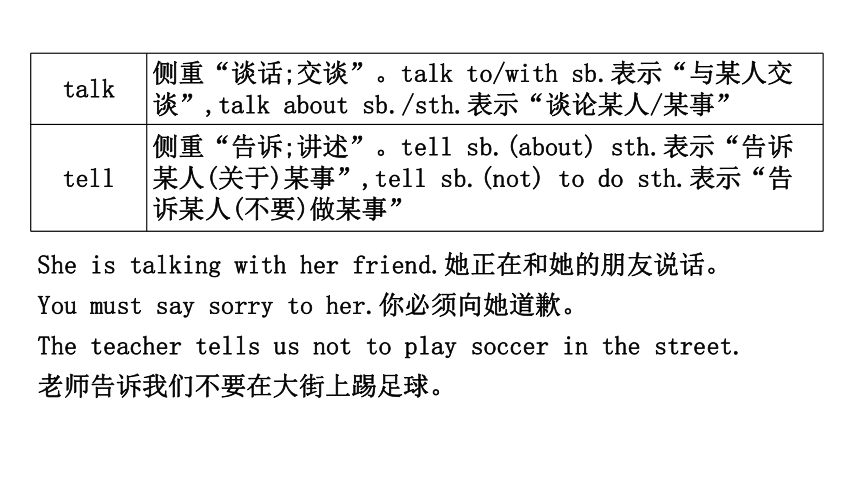
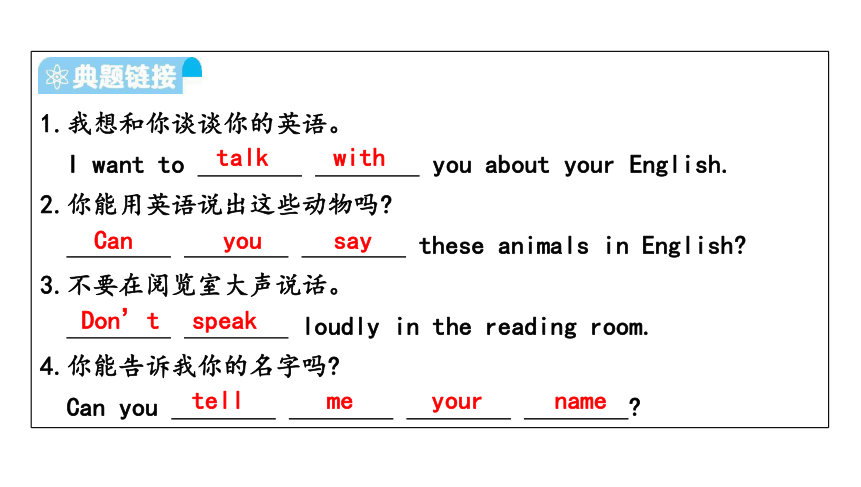
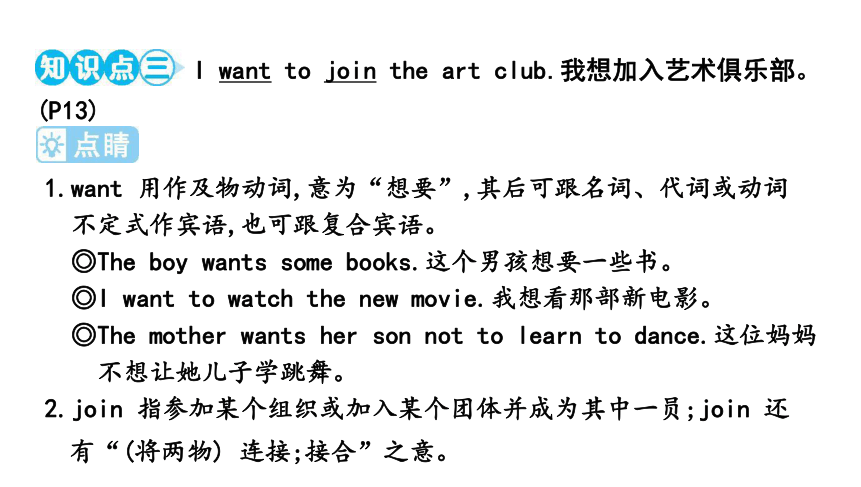
文档简介
(共22张PPT)
Section A
play chess 下象棋 (P13)
【注意】play用作不及物动词时,如果后跟宾语,则要加介词with。宾语是物时,表示“玩耍某物”;宾语是人时,表示“与某人一起玩”。
◎My dog likes to play with the ball.我的狗喜欢玩球。
◎The sports star is playing with his son.这名体育明星正和
他的儿子一起玩耍。
1.Susan always plays tennis with her good friends
after school.
2.My good friend Linda Miller can play drums very
well.
3.Can Gina and her sister Emma play violin
4.My grandfather teaches me how to play chess.
/
the
the
/
speak English 讲英语 (P13)
speak 用作及物动词,意为“说(某种语言) ”,后接表示语言的名词作宾语;speak 用作不及物动词,意为“说话”,通常指说话的能力或方式,也有“演讲;发言”之意,后跟宾语时要加介词to。
◎I can speak a little French.我会说一点儿法语。
◎I’m pleased to speak to them.跟他们谈话我十分高兴。
◎He wants to speak at the conference.他想在会上发言。
speak 可用于打电话时告诉对方你要找的人是谁。
◎May I speak to Lucy
我可以和露西通话吗
辨析:speak,say,talk与tell
辨析 含义及用法
speak 强调说话的能力和方式,可表示“演讲;发言”。另外,其后可接表示语言类的词汇。speak to sb.表示“对某人
讲;对某人说”,speak highly of sb./sth.表示“高度评价某人/某物”
say 强调说话的内容
talk 侧重“谈话;交谈”。talk to/with sb.表示“与某人交谈”,talk about sb./sth.表示“谈论某人/某事”
tell 侧重“告诉;讲述”。tell sb.(about) sth.表示“告诉某人(关于)某事”,tell sb.(not) to do sth.表示“告诉某人(不要)做某事”
She is talking with her friend.她正在和她的朋友说话。
You must say sorry to her.你必须向她道歉。
The teacher tells us not to play soccer in the street.
老师告诉我们不要在大街上踢足球。
1.我想和你谈谈你的英语。
I want to you about your English.
2.你能用英语说出这些动物吗
these animals in English
3.不要在阅览室大声说话。
loudly in the reading room.
4.你能告诉我你的名字吗
Can you
talk
with
Can
you
say
Don’t
speak
tell
me
your
name
I want to join the art club.我想加入艺术俱乐部。(P13)
1.want 用作及物动词,意为“想要”,其后可跟名词、代词或动词
不定式作宾语,也可跟复合宾语。
◎The boy wants some books.这个男孩想要一些书。
◎I want to watch the new movie.我想看那部新电影。
◎The mother wants her son not to learn to dance.这位妈妈
不想让她儿子学跳舞。
2.join 指参加某个组织或加入某个团体并成为其中一员;join 还
有“(将两物) 连接;接合”之意。
1.我想学习英语。
I learn English.
2.请来和我们一起唱歌吧。
Please come to us .
want
to
join
in
singing
Section B
I can speak English and I can also play soccer.我可以讲英语,我也可以踢足球。(P17)
辨析:also,too 与either
also “也”,较正式,用于肯定句中,常放在句中,位于连系动词、情态动词或助动词之后,实义动词之前;表示强调时,也可位于句末
too “也”,通常用于肯定句和疑问句句末。多用于口语中,语气较轻
either “也”,用于否定句中,一般放在句末
◎My grandmother also enjoys the cross talk.我奶奶也喜欢这
个相声。
◎The boy wants to ride a shared bike,too.这个男孩也想骑共
享单车。
◎She doesn’t want to be late,either.她也不想迟到。
用also,either或too填空
1.They can’t mend the shoes and we can’t, .
2.I want to see the film, .
3.We like that sports star.
either
too
also
Are you good with old people 你和老人相处得好吗 (P17)
be good with...意为“善于应付……的;对……有办法”,with 后接 sb.或sth.。
◎That man over there is good with words.那边那个人很善于言
谈。
◎His grandmother is good at using the phone.他的祖母擅长使
用手机。
◎Swimming is good for our health.游泳对我们的健康有益。
◎Little Tom is very lovely and he is always good to his dog.
小汤姆非常可爱,他总是对他的狗很好。
1.Mary is good dancing and she is good her
classmates at school.
2.Doing exercise is good our health.
3.John is not good at (sing),but he would like to
have a try.
4.She is good at math and English.(改为同义句)
She math and English.
5.这位老师对孩子们很有一套。
The teacher is very children.
at
with
for
singing
does
well
in
good
with
Then we need you to help with sports for English-speaking students.那么我们需要你帮助讲英语的学生进行体育运动。(P17)
①help sb.with sth.帮助某人某事
Can you help me with my homework 你可以帮助我做作业吗
②help sb.(to) do sth.帮助某人做某事
He often helps his mother do housework.他经常帮助他妈妈做
家务。
③with the help of 在……的帮助下
With the help of the doctor,the man gets better.在医生的帮
助下,这个人好一些了。
1.Can you help me to do the work (改为同义句)
Can you me the work
2.在他的帮助下,现在我对英语感兴趣了。
,I am interested in English
now.
help
with
With
his
help
谢谢观赏!
Section A
play chess 下象棋 (P13)
【注意】play用作不及物动词时,如果后跟宾语,则要加介词with。宾语是物时,表示“玩耍某物”;宾语是人时,表示“与某人一起玩”。
◎My dog likes to play with the ball.我的狗喜欢玩球。
◎The sports star is playing with his son.这名体育明星正和
他的儿子一起玩耍。
1.Susan always plays tennis with her good friends
after school.
2.My good friend Linda Miller can play drums very
well.
3.Can Gina and her sister Emma play violin
4.My grandfather teaches me how to play chess.
/
the
the
/
speak English 讲英语 (P13)
speak 用作及物动词,意为“说(某种语言) ”,后接表示语言的名词作宾语;speak 用作不及物动词,意为“说话”,通常指说话的能力或方式,也有“演讲;发言”之意,后跟宾语时要加介词to。
◎I can speak a little French.我会说一点儿法语。
◎I’m pleased to speak to them.跟他们谈话我十分高兴。
◎He wants to speak at the conference.他想在会上发言。
speak 可用于打电话时告诉对方你要找的人是谁。
◎May I speak to Lucy
我可以和露西通话吗
辨析:speak,say,talk与tell
辨析 含义及用法
speak 强调说话的能力和方式,可表示“演讲;发言”。另外,其后可接表示语言类的词汇。speak to sb.表示“对某人
讲;对某人说”,speak highly of sb./sth.表示“高度评价某人/某物”
say 强调说话的内容
talk 侧重“谈话;交谈”。talk to/with sb.表示“与某人交谈”,talk about sb./sth.表示“谈论某人/某事”
tell 侧重“告诉;讲述”。tell sb.(about) sth.表示“告诉某人(关于)某事”,tell sb.(not) to do sth.表示“告诉某人(不要)做某事”
She is talking with her friend.她正在和她的朋友说话。
You must say sorry to her.你必须向她道歉。
The teacher tells us not to play soccer in the street.
老师告诉我们不要在大街上踢足球。
1.我想和你谈谈你的英语。
I want to you about your English.
2.你能用英语说出这些动物吗
these animals in English
3.不要在阅览室大声说话。
loudly in the reading room.
4.你能告诉我你的名字吗
Can you
talk
with
Can
you
say
Don’t
speak
tell
me
your
name
I want to join the art club.我想加入艺术俱乐部。(P13)
1.want 用作及物动词,意为“想要”,其后可跟名词、代词或动词
不定式作宾语,也可跟复合宾语。
◎The boy wants some books.这个男孩想要一些书。
◎I want to watch the new movie.我想看那部新电影。
◎The mother wants her son not to learn to dance.这位妈妈
不想让她儿子学跳舞。
2.join 指参加某个组织或加入某个团体并成为其中一员;join 还
有“(将两物) 连接;接合”之意。
1.我想学习英语。
I learn English.
2.请来和我们一起唱歌吧。
Please come to us .
want
to
join
in
singing
Section B
I can speak English and I can also play soccer.我可以讲英语,我也可以踢足球。(P17)
辨析:also,too 与either
also “也”,较正式,用于肯定句中,常放在句中,位于连系动词、情态动词或助动词之后,实义动词之前;表示强调时,也可位于句末
too “也”,通常用于肯定句和疑问句句末。多用于口语中,语气较轻
either “也”,用于否定句中,一般放在句末
◎My grandmother also enjoys the cross talk.我奶奶也喜欢这
个相声。
◎The boy wants to ride a shared bike,too.这个男孩也想骑共
享单车。
◎She doesn’t want to be late,either.她也不想迟到。
用also,either或too填空
1.They can’t mend the shoes and we can’t, .
2.I want to see the film, .
3.We like that sports star.
either
too
also
Are you good with old people 你和老人相处得好吗 (P17)
be good with...意为“善于应付……的;对……有办法”,with 后接 sb.或sth.。
◎That man over there is good with words.那边那个人很善于言
谈。
◎His grandmother is good at using the phone.他的祖母擅长使
用手机。
◎Swimming is good for our health.游泳对我们的健康有益。
◎Little Tom is very lovely and he is always good to his dog.
小汤姆非常可爱,他总是对他的狗很好。
1.Mary is good dancing and she is good her
classmates at school.
2.Doing exercise is good our health.
3.John is not good at (sing),but he would like to
have a try.
4.She is good at math and English.(改为同义句)
She math and English.
5.这位老师对孩子们很有一套。
The teacher is very children.
at
with
for
singing
does
well
in
good
with
Then we need you to help with sports for English-speaking students.那么我们需要你帮助讲英语的学生进行体育运动。(P17)
①help sb.with sth.帮助某人某事
Can you help me with my homework 你可以帮助我做作业吗
②help sb.(to) do sth.帮助某人做某事
He often helps his mother do housework.他经常帮助他妈妈做
家务。
③with the help of 在……的帮助下
With the help of the doctor,the man gets better.在医生的帮
助下,这个人好一些了。
1.Can you help me to do the work (改为同义句)
Can you me the work
2.在他的帮助下,现在我对英语感兴趣了。
,I am interested in English
now.
help
with
With
his
help
谢谢观赏!
同课章节目录
- Unit 1 When is your birthday?
- Section A
- Section B
- Unit 2 My favourite subject is science
- Section A
- Section B
- Unit 3 Can you play the guitar?
- Section A
- Section B
- Unit 4 What time do you go to school?
- Section A
- Section B
- Unit 5 How do you get to school?
- Section A
- Section B
- Unit 6 Don't eat in class.
- Section A
- Section B
- Unit 7 Why do you like pandas?
- Section A
- Section B
- Unit 8 I'm watching TV.
- Section A
- Section B
- Unit 9 It's raining!
- Section A
- Section B
- Unit 10 Is there a post office near here?
- Section A
- Section B
